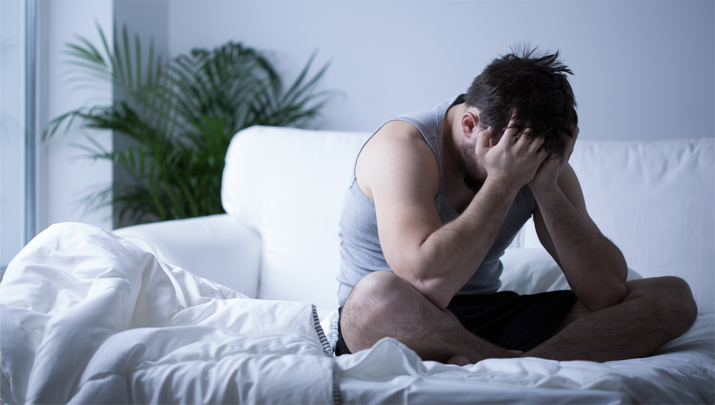
What Is Circadian Rhythm?

Circadian rhythm is the body’s natural timing system—or internal clock. Most human bodies are on a natural cycle of 23.5 to 24.5 hours. Circadian Rhythm is regulated by a cluster of cells at the center of the brain called the suprachiasmatic nuclei (SCN). Our eyes perceive light, and light conditions give the SCN signals about the time of day that help to regulate our circadian rhythm. When the body doesn’t receive adequate light at the natural times, circadian rhythm disorders can be the result.
What Does Circadian Rhythm Do?
Circadian rhythm affects sleep and waking cycles, body temperature and certain hormonal changes. Our body temperature falls at night and starts to rise as morning nears— this increased body temperature is part of what helps us feel awake in the morning. There is also a slight drop in body temperature between 2PM and 4PM, which may help explain why a post-lunch slump is often felt in the afternoon. Our bodies also create the hormone melatonin at night. It’s believed the body uses this increased hormone level as a signal that it’s time to sleep. Circadian rhythm also plays a role in cortisol production, glucose regulation, insulin regulation and growth of new skin cells.
Why Is It Important?
A healthy circadian rhythm is important because when the body’s timing system is thrown off, sleep disorders and other disorders can be the result. Irregular sleep-wake rhythm, jet lag, shift work disorder, delayed sleep phase disorder and advanced sleep phase disorder are all examples of these.
- Irregular sleep-wake rhythm: People with this circadian sleep disorder are unable to stick to a set sleep schedule, no matter how hard they try. They may feel sleepy when they want to stay awake and have trouble falling asleep or staying asleep when they want to be in bed.
- Jet lag: Circadian rhythm can be thrown off when traveling across time zones. The more time zones crossed, the more pronounced the effect. Symptoms of jet lag include daytime sleepiness, indigestion, insomnia (the inability to fall asleep or stay asleep, or waking earlier than planned), irritability and poor concentration. Many people experience a mild form of jet lag twice a year when Daylight Savings Time makes the clocks change. Jet lag is the most common circadian sleep disorder.
- Shift work disorder: Shift work circadian disorder has some of the same effects as jet lag. In this case, rather than crossing time zones, a person works night shifts or rotates between day and night shifts.
- Delayed Sleep Phase Disorder: This circadian sleep disorder makes it difficult to fall asleep at one’s desired time (typically at night). People with this condition, more likely to be young adults than older adults, may stay awake until 2AM or later, making it difficult to wake up on a typical morning schedule. As a result, they may be late to work or school.
- Advanced Sleep Phase Disorder: More common in older adults than younger adults, this circadian sleep disorder involves feeling sleepy early in the afternoon. They may go to bed early and subsequently wake up too early and be unable to get back to sleep. Advanced sleep phase disorder can make it difficult for its sufferers to keep social or business commitments in the late evening.
Disruptions in the natural circadian rhythm have also been linked to obesity, changes in eating patterns, increased risk for cardiovascular disease, decreased motor and cognitive functions, depression and bipolar disorder.
Tips for Fostering a Healthy Circadian Rhythm
Always consult a physician if you think you may have a sleep disorder. They can evaluate your symptoms, help identify the problem, as well as instruct you on how to proceed with treatment, if necessary. Unusual sleeping patterns can also be a symptom of depression, so make sure to notify your physician if you notice changes in your sleep pattern.
To minimize the experience of jet lag when traveling, individuals should plan a short nap in their itinerary. Allowing enough rest while traveling gives the body much-needed time to adjust to the new time zone. Those who know they will be working a different shift than they are used to should provide themselves with adequate sleeping time when adjusting to the new schedule. It may be tempting to stay awake when other members of the household or friends are awake, but inadequate sleep tends to exaggerate the symptoms of circadian disorders.
A sleep specialist can help with circadian rhythm disorders. Bright light therapy is sometimes used to help the body reset its internal timing mechanisms. Exposure to bright light in the morning is used to treat delayed sleep phase disorder, and bright light in the evening can be used to treat advanced sleep phase disorder. In some cases, sleep specialists may also recommend using a melatonin supplement to help reset the body’s circadian rhythms. Melatonin has very few side effects, since it is made naturally by the body.
A healthy circadian rhythm is key to consistent quality sleep. However, it can be disrupted not only before, but during sleep as well. This why sleep disorders—such as sleep apnea—can affect circadian rhythm even though they aren’t classified as a circadian rhythm disorder. If you think you may have sleep apnea, don’t let your breathing, circadian rhythm and sleep schedule be affected any longer. Speak to your physician about the convenience of an at-home sleep test from the experts at Home Sleep Delivered—your one-stop-shop for at-home sleep testing, CPAP supplies and resupplies!


